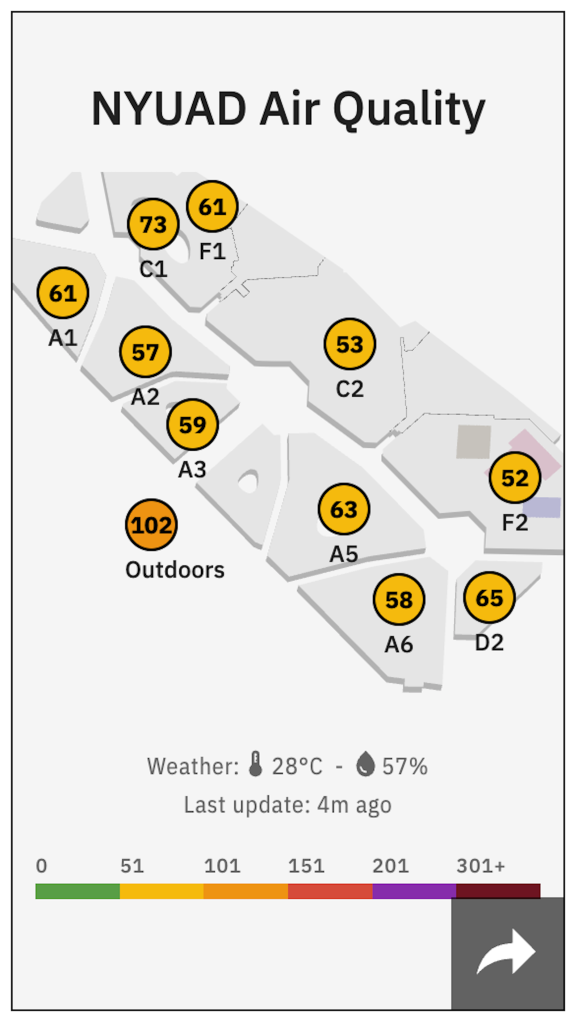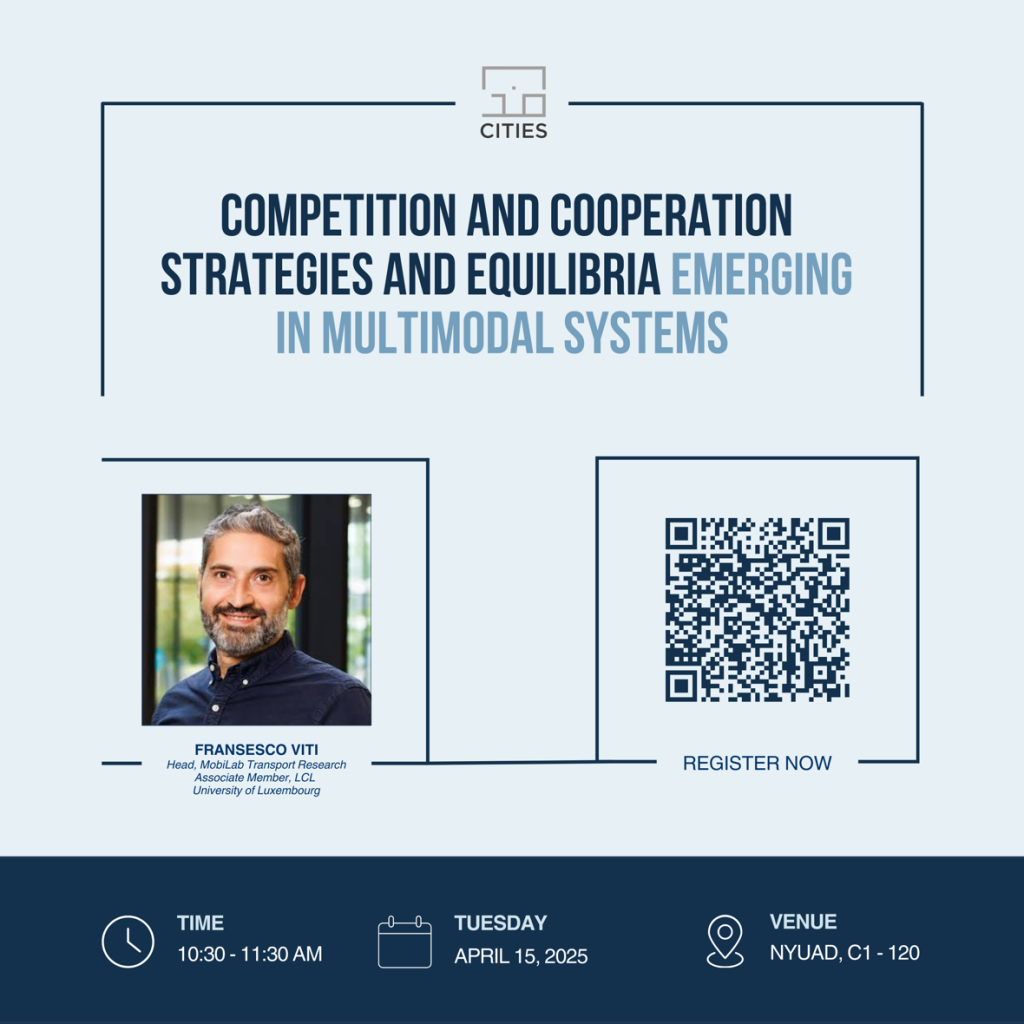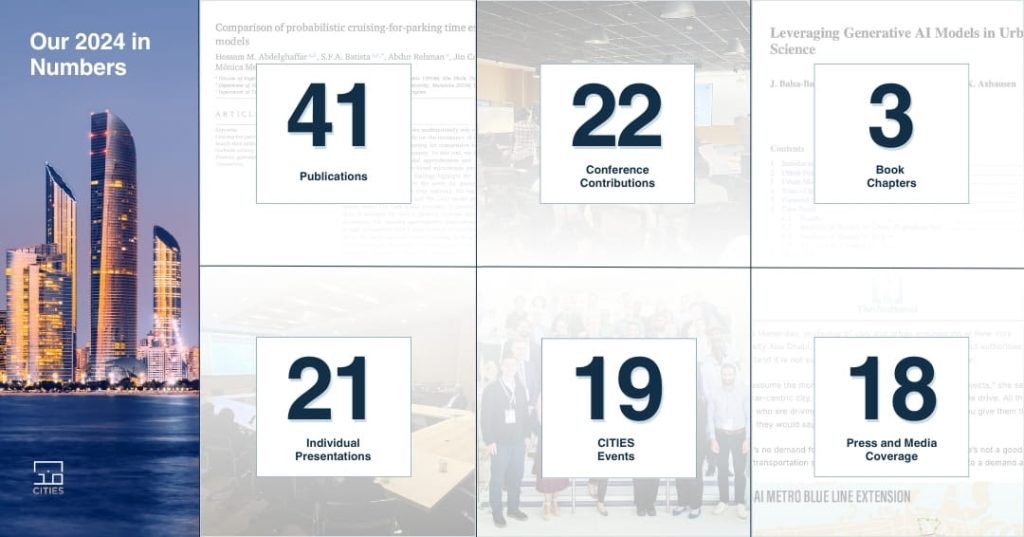
CITIES Research
The Center for Interacting Urban Networks (CITIES) at New York University Abu Dhabi (NYUAD) is an interdisciplinary research center dedicated to advance urban science and promote cutting-edge research that is translated into practical, real-world solutions for the benefit of society. Our ultimate goal is to foster sustainable, resilient, and equitable cities with a particular emphasis on Abu Dhabi and the UAE.
This newsletter offers an overview of CITIES’ ongoing research efforts and initiatives for a more sustainable approach to the way we live in our cities and interact with the built environment. Below are two projects showcasing some of the work we are doing on economic resilience and global interconnectivity.

Economic Resilience Index: A Framework for Sustainable Growth in the GCC
Dr. Abdullah Kaya, Postdoctoral Researcher, CITIES NYUAD
The Gulf Cooperation Council (GCC) states face mounting economic challenges as they navigate a post-oil future shaped by global economic uncertainties and climate change. Addressing these challenges requires a comprehensive framework to assess and enhance economic resilience while promoting fairness and stability. To this end, our research introduces the Economic Resilience Index (ERI), a pioneering tool designed to evaluate and strengthen resilience across the GCC.
The ERI is structured around three core dimensions: Tacit Resilience, which includes governance quality, rule of law, and knowledge-based economic advancement; Physical Resilience, encompassing infrastructure quality, climate adaptability, and cybersecurity; and Financial Resilience, which focuses on GDP per capita, income equality, and sovereign wealth fund robustness. This multifaceted approach ensures a holistic resilience assessment while addressing systemic uncertainties and fostering equitable economic growth.
By integrating global best practices, such as the Corruption Perceptions Index, Rule of Law Index, and region-specific indicators, the ERI aims to provide actionable insights for policymakers. This research aligns with the GCC’s vision for sustainable development, offering a roadmap to stability in an evolving global landscape.

Measuring Foreign Exposure
Jean Imbs, Professor of Economics, NYUAD & Laurent Pauwels, Research Scientist, NYUAD
The pandemic, the war in Ukraine, and global geopolitics have resuscitated concerns about exposure to foreign developments. But the concept is devilishly difficult to capture empirically: while measures of openness abound, their ability to capture the influence of foreign developments on domestic outcomes remains speculative, especially in a globalized world.
When considering global value chains (GVC), the extent to which an activity trades directly with the world does not fully capture its foreign exposure. For instance, a law firm that collaborates with a local multinational corporation will be significantly—though indirectly—affected by foreign shocks, even if it operates domestically.
We propose a novel measure that computes the fraction of output in a specific sector that crosses a border, either directly or indirectly, via GVCs. Activities within supply chains that cross a border will be exposed to foreign shocks to an extent that depends on the importance of foreign inputs in production. Our proposed measure quantifies exactly this notion of exposure.
In today’s interconnected world, our measure reveals that numerous activities traditionally viewed as non-traded or domestic—such as business services, retail, wholesale, personal services, and IT—are actually highly vulnerable to foreign shocks. This insight contrasts sharply with traditional openness measures, which often underestimate indirect exposure through GVCs. Conventional measures of exposure typically suggest most activities are insulated from foreign shocks because they do not trade themselves internationally—an outdated notion in our globalized era. Furthermore, our measure shows a strong correlation with other observable consequences of foreign shocks, unlike its more traditional predecessors. The interconnections between industries across countries are far more intricate than previously thought.

A look back at the 3rd CITIES Symposium, held on November 21, 2024.
This symposium provided a platform to discuss cutting-edge research and practical approaches to enhance the sustainability and livability of our cities, with a particular focus on Abu Dhabi and the UAE.
This year’s discussions centered on critical themes of mobility, fairness, and uncertainty, featuring insightful contributions from esteemed speakers, including Profs. Satish Ukkusuri, Andres Sevtsuk, Serge Hoogendoorn, Gerard Torrats-Espinosa, Elizabeth Roberto, Eduardo Tapia, Remco Chang, and Zachary Ives.
We are proud to have hosted this event, which continues to foster meaningful dialogue and inspire interdisciplinary and innovative strategies to address the pressing challenges of urbanization.
CITIES’ Catalyst Fund
The Center for Interacting Urban Networks (CITIES) at NYUAD invites NYU faculty to submit research proposals for CITIES’ CATALYST FUND.
Proposals should align with CITIES’ themes’ vision and mission (see here). Winning proposals will be granted up to 0.5 months of summer salary. Exceptional proposals that align with CITIES’ research themes will be granted up to 1 month of summer salary to pursue an ongoing research project or jump-start a new one. Successful projects may receive additional funding from AY25-26 onward.
Proposals are due by the end of the day on January 31st, 2025. Please send them to nyuad.cities@nyu.edu. Winning proposals will be announced by February 2025.
New Campus Air Quality Banners
Check out the new design of the air quality banners on the Students Portal and Intranet! Now, with a bird’s eye view map of the NYU Abu Dhabi campus, community members can quickly glance at the air quality indexes of 10 air quality sensors across all campus buildings. CITIESair, spearheaded by the Center for Interacting Urban Networks (CITIES), is an integrated system of air quality devices and specialized software designed for educational institutions in Abu Dhabi. At NYU Abu Dhabi, CITIESair has installed 10 air quality sensors to enable hyperlocal, continuous, and long-term monitoring to assess indoor air quality comprehensively. Our ultimate goal is to establish data-driven policies to safeguard NYU Abu Dhabi community members and deliver the highest indoor air quality standards.


We are excited to announce that the CUSP London Data Dive 2025 will take place from February 18th to 21st, 2025. This year’s theme is Sustainability. You can find the full schedule and program details at this link. CITIES will be supporting two NYUAD teams that will be presenting online.
Join us at CITIES (Post-Doctoral Opportunities at CITIES)
CITIES (Center for Interacting Urban Networks) at NYU Abu Dhabi is seeking Post-Doctoral Associates for three exciting research themes:
Each position offers a unique opportunity to engage in interdisciplinary research at the forefront of urban science. Contribute to impactful projects and collaborate with global experts.
CITIES Tamayyuz Research Fellowship
The Tamayyuz Research Fellowship in CITIES is designed for students who wish to explore research directions and graduate school possibilities, specifically in the area of urban science, spanning disciplines from Engineering through Computer Science, Sociology, History, and the Arts.
The CITIES fellowship is awarded annually and was first activated in AY 19-20. Thanks to their talent and to the fellowship experience, our fellows have been accepted to prestigious schools for their graduate studies, including the University of California Berkeley (USA), MIT (USA), and Politecnico di Milano (Italy).
In AY 25-26, CITIES will open its sixth call for applications. Applications should align with CITIES’ vision, mission, and main research objectives. All projects related to urban science are welcome. Projects with an NYUAD community engagement perspective (e.g., through data collection and other initiatives) are particularly encouraged. A section of the proposal (approx. 250 words) must be dedicated to explaining how the proposed project aligns with CITIES’ vision and mission.
For more information and to access the application form, click here.
CITIES Upcoming Events
Join us for the upcoming events organized by our center:


CITIES Research Outputs

You can access the whole list of CITIES publications and other research outputs using this link.
Stay tuned for the Issue #14 of our newsletter that will come out in May, 2025.
The Center for Interacting Urban Networks (CITIES) is funded by Tamkeen under the NYUAD Research Institute Award CG001.